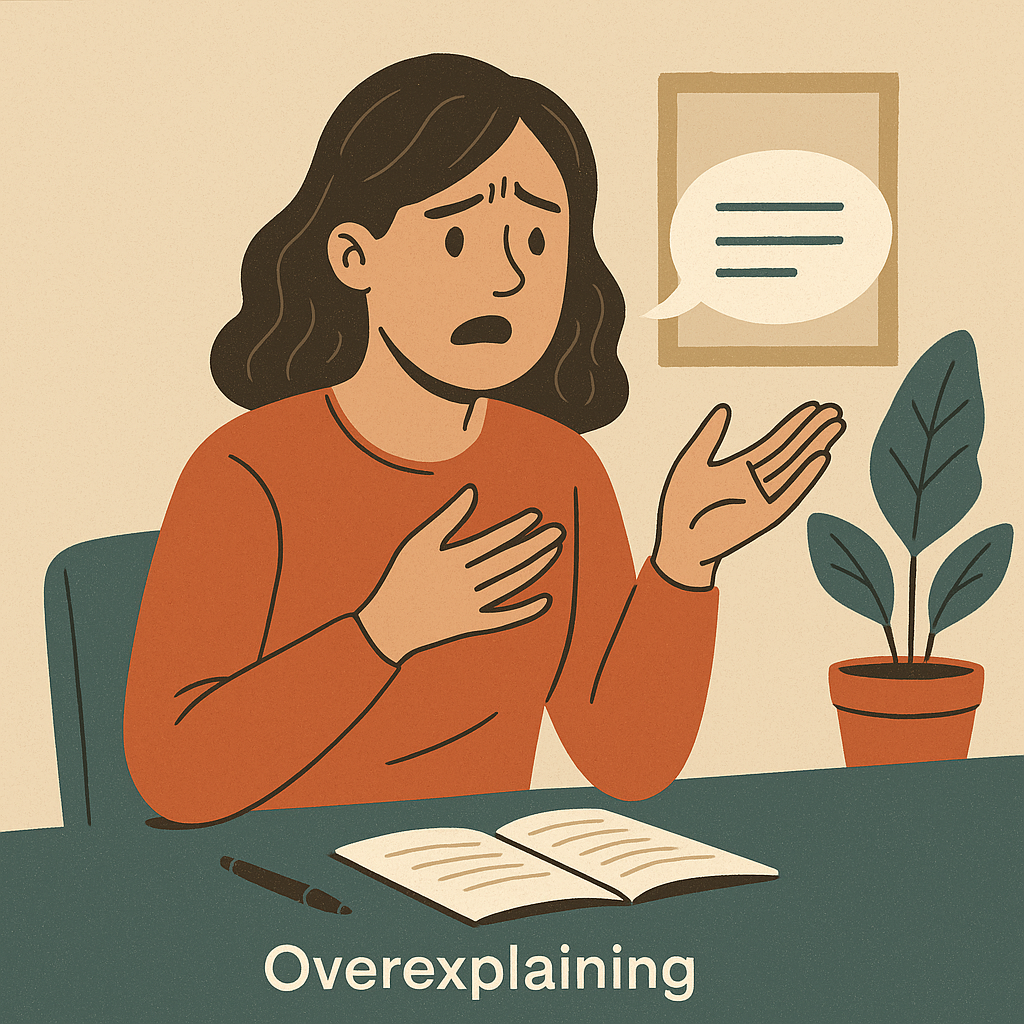6 Subtle Trauma Responses That Might Be Hiding in Your Everyday Life
When people think of trauma, they often picture dramatic events or visible breakdowns. But trauma doesn’t always show up that way.
Some trauma responses are quiet. Hidden. Normalized.
They show up in daily habits — the way you talk, say yes when you mean no, or struggle to rest.
These subtle signs of trauma are just as important to recognize. Because they might be keeping you stuck in survival mode long after the danger has passed.
In this article, we’ll explore six common subtle trauma responses in daily life, what they mean, and how techniques like EFT tapping can help you begin to heal.
Learn about what we offer in our “Trauma Support Package” here
1. Overexplaining Everything
Overexplaining is a common trauma response — a way the nervous system tries to stay safe by avoiding rejection, criticism, or conflict. You might find yourself giving long explanations for small things, apologizing too often, or trying to make sure others understand your intentions just right.
This pattern often develops when you've learned that being misunderstood could lead to consequences — like being dismissed, punished, or made to feel like a burden. If you grew up in an environment where your voice wasn’t heard, your feelings weren’t validated, or your needs weren’t respected, overexplaining can become second nature.
It may feel like a way to earn safety, approval, or permission — but it can also leave you feeling drained and unsure of yourself. The good news is that, with awareness and nervous system support, this pattern can begin to shift.
2. Emotional Numbness or Feeling “Flat”
If you rarely feel strong emotions — or can’t seem to cry even when you’re sad — this could be a sign of emotional shutdown.
This is your body protecting you. Numbness is a survival mechanism, especially for those who’ve experienced overwhelming or chronic stress. It’s not apathy. It’s protection.
3. People-Pleasing and Struggling to Set Boundaries
Do you say “yes” to things you don’t want to do? Do you fear letting people down?
People-pleasing can be a subtle trauma response, especially in those who learned that approval = safety. This pattern is common in survivors of childhood trauma, emotional neglect, or toxic relationships.
4. Anxiety When You Try to Rest
If slowing down makes you feel uneasy, restless, or even guilty — you’re not alone.
For many people with a history of chronic stress or trauma, rest doesn’t feel relaxing — it feels unfamiliar, even unsafe. When your nervous system has spent years in survival mode, constantly scanning for danger or staying busy can become your default setting.
You might feel a wave of discomfort when you try to pause — like you're being “lazy” or that something bad might happen if you're not constantly doing. This isn’t a flaw in you — it’s a sign your body has learned that stillness equals vulnerability.
With the right support, it’s possible to teach your system that rest is safe again — and that you’re allowed to slow down without fear.
5. Trouble Feeling Joy or Celebrating Wins
Trauma can dull joy.
If you're used to being on guard, you may struggle to fully experience happiness or relaxation — even during positive events.
Your nervous system might not know how to relax into pleasure because it’s still wired for protection.
6. Always Waiting for Something Bad to Happen
Do you constantly anticipate the worst-case scenario?
Hypervigilance is a classic trauma response. It’s the body’s way of preparing for danger, especially after living through unpredictability, chaos, or emotional harm.
Why These Daily Trauma Responses Matter
These patterns aren’t personality flaws. They’re survival strategies.
Your nervous system learned them to keep you safe — and that’s something to appreciate.
But when these trauma responses linger, they can hold you back from living fully. They keep you in a loop of anxiety, overthinking, exhaustion, and disconnection.
How EFT Tapping Can Help with Trauma Responses
Emotional Freedom Techniques (EFT), also known as tapping, is a gentle, body-based method for calming the nervous system and shifting emotional patterns that may be rooted in past experiences.
By gently tapping on specific acupressure points while tuning into particular emotions or memories, EFT can help:
Soothe the body’s stress response
Trauma often leaves the body in a chronic state of hypervigilance. Tapping helps calm the fight-flight-freeze response by sending calming signals to the brain — particularly the amygdala, which plays a key role in fear and stress.Interrupt old emotional patterns
Many trauma responses — like shutting down, lashing out, people-pleasing, or avoiding conflict — are automatic reactions. EFT helps bring awareness to these patterns and gradually softens them, so you're no longer ruled by old coping mechanisms.Restore a sense of safety in the body
Trauma can make the body feel unsafe, even long after the event is over. EFT creates a gentle space to reconnect with your body and rebuild a felt sense of safety, one tap at a time.Reprocess stuck memories or emotions
While EFT doesn’t require reliving painful details, it can help reduce the emotional charge of past events — so they no longer feel as triggering or overwhelming.Build emotional resilience
Regular tapping supports emotional regulation, making it easier to stay present and grounded, even during stress or conflict. Over time, this builds a greater sense of internal stability and confidence.
Learn about what we offer in our “Trauma Support Package” here
Most importantly, EFT creates lasting change — not just temporary relief.
Because it works at the level of the nervous system and subconscious, EFT doesn’t just mask symptoms — it helps address the root of them. Tapping creates real physiological shifts, calming the body’s stress response and allowing emotional patterns that once felt automatic or overwhelming to gradually soften.
Over time, the nervous system learns new ways of responding. Many people find that once a particular reaction eases through tapping, it doesn’t come back with the same intensity — even when they’re faced with similar situations or triggers. What once felt like an unavoidable spiral of anxiety, shutdown, or people-pleasing can begin to feel more spacious, manageable, and less charged.
That’s what makes EFT such a powerful tool for lasting healing and personal growth. It doesn’t require years of rehashing the past — it works gently with the body, creating change from the inside out, one tap at a time.
Want to try it for yourself?
Book a free EFT session to explore how tapping can support your healing journey.
You’re not broken. You’re healing.
And with the right tools and support, you can begin to feel safe, calm, and connected again — one step at a time.



